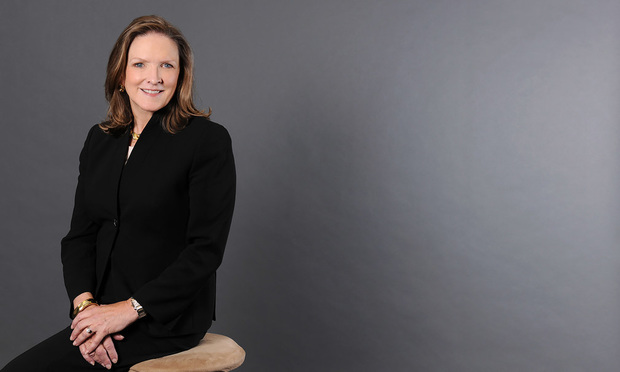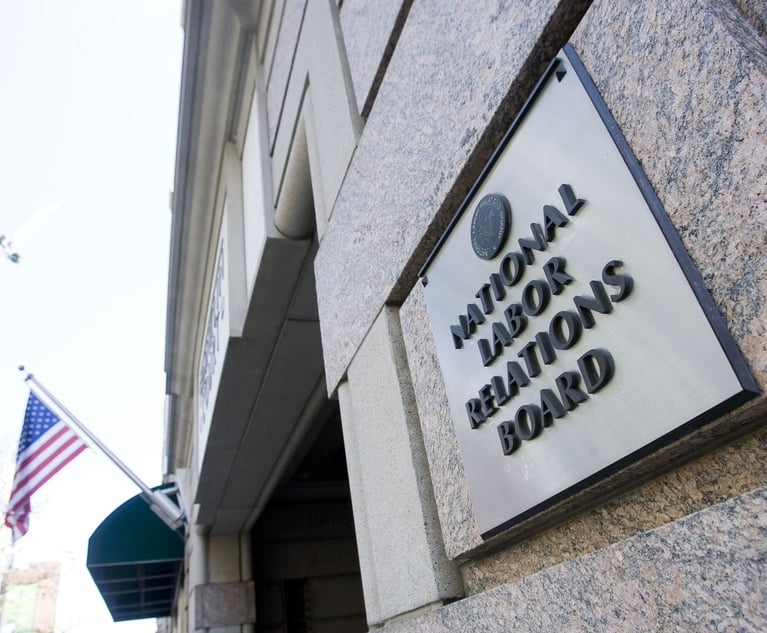The NLJ 500: Career-Nurturing Firms Win High Rankings on Women-in-Law Scorecard
“Women attract women. They know we want to pay it forward,” a managing partner of firm that moved up on the NLJ Women in Law Scorecard says.
June 28, 2018 at 06:00 AM
6 minute read
 Gwendolyn Robosson, Partner with Fragomen.
Gwendolyn Robosson, Partner with Fragomen.
If other law firms seek to emulate her firm's success at attracting women lawyers to their rosters, they should adopt a gentler and kinder approach to running their operations, recommends Gwen Robosson, a senior partner at Fragomen, Del Rey, Bernsen & Loewy, a New York-based immigration boutique firm.
 Personalize NLJ 500 and Am Law 200 data using year-over-year comparison plus Lateral, Office, and Event Trends. Learn More
Personalize NLJ 500 and Am Law 200 data using year-over-year comparison plus Lateral, Office, and Event Trends. Learn More“I would describe our culture as not being a harsh culture. We are a very embracing,” says Robosson, who sits on Fragomen's executive committee.
For the seventh year in a row, Fragomen holds the top spot on The National Law Journal's Women in Law Scorecard, which ranks the nation's largest law firms according to their percentages of women attorneys.
View the Chart: Women in Law Scorecard 2018
In 2017, women made up 63 percent of the Fragomen's 553 lawyers. Women accounted for nearly half (44 percent) of the equity partners and fully two-thirds (68 percent) of associates at the firm.
This year's rankings were determined based on survey responses from 264 of the nation's 350 largest law firms by head count in the NLJ's annual report. The Women in Law Scorecard is calculated by adding each firm's percentage of women attorneys with its percentage of women partners—a formula that gives weight to women in partnership positions.
Among the responding firms, women comprised 36 percent of all the 135,060 attorneys reported in 2017. Among the equity partnership ranks, women made up 19 percent of the 31,658 of the total partners reported. And women also comprised slightly over 46 percent of 63,731 associates reported.
“The lawyers here don't ever feel threatened,” Robosson says. There is no up-or-out ideology (also known as make-rain-or-leave philosophy) guiding the firm's management strategy, she says. Instead, the firm remains a meritocracy and creates a career-nurturing environment for lawyers with a wide range of skill sets.
“We make a strong effort to avoid the eat-what-you-kill approach,” Robosson says. In that same vein, the firm doesn't allow for a gaping divide between the top and the bottom of the partner compensation scale, she says.
“It would be fair to say women partners in the firm would not feel as though that they were disadvantaged financially vis-a-vis the rainmakers or senior partners who are not women. There's no huge gap. There isn't a sense of disparate treatment,” Robosson says.
But women lawyers who take on leadership roles are compensated for those. “I also think an important factor in retaining women is the knowledge here that you can take on as much as responsibility you choose to. That's exciting. I can raise my hand and know I might be eligible to manage some of our major practices,” Robosson says.
Littler Mendelson, the national labor and employment firm, also consistently captures a high rung on the Scorecard every year, holding steady at fifth place this year and last year. In 2017, women made up 49 percent of the Littler's 1,043 lawyers. Women accounted for 30 percent of the equity partners and 56 percent of associates at the firm.
 Personalize NLJ 500 and Am Law 200 data using year-over-year comparison plus Lateral, Office, and Event Trends. Learn More
Personalize NLJ 500 and Am Law 200 data using year-over-year comparison plus Lateral, Office, and Event Trends. Learn More“This stuff doesn't happen by accident. You have to treasure talent, engage in a continuous process and seek improvements,” says Jeremy Roth, a Littler co-president and co-managing director. To initiate and implement programs that effectively make the firm's workplace more diverse and add women to its lawyer roster, retain and promote them, Littler's management cherry-picks from other employers' programs, Roth says.
“We are not shy about stealing good ideas,” Roth says. Recently, those “good ideas” have included a program to help new mothers working on away-from-home assignments. The firm arranged to have breast milk collected and delivered to those mothers' babies.
Not only does Littler borrow good ideas, but the firm management is also amenable to giving them away—and did so willing when a Skadden Arps Slate Meagher & Flom representative sought to learn more about Littler's “career advocacy” program, Roth says. First piloted in 2012 and then launched in 2014, Littler's management through the program identifies mid-level, high-performing associates in traditionally underrepresented groups, including women, and pairs them with shareholders who serve as their “advocates” to help them develop as lawyers.
Skadden landed at 81st on the Women in Law Scorecard this year—up from 104th the previous year. In 2017, women made up 39 percent of Skadden's 1,784 lawyers. Women accounted for 21 percent of the equity partners and 43 percent of associates at the firm. A firm spokeswoman did not respond to an inquiry for the story.
Hogan Lovells earned the distinction of being the only firm to rank among the top 30 on the AmLaw 100 gross revenues-based roster and break into the top 30 on NLJ's Women in Law scorecard. The firm was the fifth-highest-grossing firm on the AmLaw 100s. It ranked 28th on the NLJ's Women in Law Scorecard. In 2017, women made up 44 percent of the Hogan Lovells' 2,685 lawyers. Women accounted for 22 percent of its equity partners and 54 percent of its associates.
Clients are helping encourage Hogan Lovells to become more diverse, according to Leslie Richards-Yellen, director of inclusion for Hogan Lovells in the Americas. Earlier this year, she says, 47 clients requested diversity demographics from the firm in the first quarter of 2018—nearly double the 25 requests over the same period last year.
Another firm that improved on this year's NLJ scorecard is Foley & Mansfield, which moved up to 11th place from 17th. In 2017, women made up 40 percent of the firm's 160 lawyers. Women accounted for 12 percent of the equity partners and 46 percent of associates at the firm.
Of the 23 lawyers that Foley & Mansfield hired in 2017, 12 were women, according to Virginia Easley Johnson, the managing partner of the firm's Miami office. How is that firm making such progress in attracting women? Critical mass. “Women attract women. They know we want to pay it forward,” Johnson says.
This content has been archived. It is available through our partners, LexisNexis® and Bloomberg Law.
To view this content, please continue to their sites.
Not a Lexis Subscriber?
Subscribe Now
Not a Bloomberg Law Subscriber?
Subscribe Now
NOT FOR REPRINT
© 2025 ALM Global, LLC, All Rights Reserved. Request academic re-use from www.copyright.com. All other uses, submit a request to [email protected]. For more information visit Asset & Logo Licensing.
You Might Like
View All
Testing Legal Authority, Trump Fires NLRB Member, Leaving Panel Without Quorum
3 minute read
Trump Administration Faces Legal Challenge Over EO Impacting Federal Workers
3 minute read
Three Akin Sports Lawyers Jump to Employment Firm Littler Mendelson

Supreme Court Appears Hostile to Higher Burden for Employers in FLSA Cases
Trending Stories
- 1Public Notices/Calendars
- 2Wednesday Newspaper
- 3Decision of the Day: Qui Tam Relators Do Not Plausibly Claim Firm Avoided Tax Obligations Through Visa Applications, Circuit Finds
- 4Judicial Ethics Opinion 24-116
- 5Big Law Firms Sheppard Mullin, Morgan Lewis and Baker Botts Add Partners in Houston
Who Got The Work
J. Brugh Lower of Gibbons has entered an appearance for industrial equipment supplier Devco Corporation in a pending trademark infringement lawsuit. The suit, accusing the defendant of selling knock-off Graco products, was filed Dec. 18 in New Jersey District Court by Rivkin Radler on behalf of Graco Inc. and Graco Minnesota. The case, assigned to U.S. District Judge Zahid N. Quraishi, is 3:24-cv-11294, Graco Inc. et al v. Devco Corporation.
Who Got The Work
Rebecca Maller-Stein and Kent A. Yalowitz of Arnold & Porter Kaye Scholer have entered their appearances for Hanaco Venture Capital and its executives, Lior Prosor and David Frankel, in a pending securities lawsuit. The action, filed on Dec. 24 in New York Southern District Court by Zell, Aron & Co. on behalf of Goldeneye Advisors, accuses the defendants of negligently and fraudulently managing the plaintiff's $1 million investment. The case, assigned to U.S. District Judge Vernon S. Broderick, is 1:24-cv-09918, Goldeneye Advisors, LLC v. Hanaco Venture Capital, Ltd. et al.
Who Got The Work
Attorneys from A&O Shearman has stepped in as defense counsel for Toronto-Dominion Bank and other defendants in a pending securities class action. The suit, filed Dec. 11 in New York Southern District Court by Bleichmar Fonti & Auld, accuses the defendants of concealing the bank's 'pervasive' deficiencies in regards to its compliance with the Bank Secrecy Act and the quality of its anti-money laundering controls. The case, assigned to U.S. District Judge Arun Subramanian, is 1:24-cv-09445, Gonzalez v. The Toronto-Dominion Bank et al.
Who Got The Work
Crown Castle International, a Pennsylvania company providing shared communications infrastructure, has turned to Luke D. Wolf of Gordon Rees Scully Mansukhani to fend off a pending breach-of-contract lawsuit. The court action, filed Nov. 25 in Michigan Eastern District Court by Hooper Hathaway PC on behalf of The Town Residences LLC, accuses Crown Castle of failing to transfer approximately $30,000 in utility payments from T-Mobile in breach of a roof-top lease and assignment agreement. The case, assigned to U.S. District Judge Susan K. Declercq, is 2:24-cv-13131, The Town Residences LLC v. T-Mobile US, Inc. et al.
Who Got The Work
Wilfred P. Coronato and Daniel M. Schwartz of McCarter & English have stepped in as defense counsel to Electrolux Home Products Inc. in a pending product liability lawsuit. The court action, filed Nov. 26 in New York Eastern District Court by Poulos Lopiccolo PC and Nagel Rice LLP on behalf of David Stern, alleges that the defendant's refrigerators’ drawers and shelving repeatedly break and fall apart within months after purchase. The case, assigned to U.S. District Judge Joan M. Azrack, is 2:24-cv-08204, Stern v. Electrolux Home Products, Inc.
Featured Firms
Law Offices of Gary Martin Hays & Associates, P.C.
(470) 294-1674
Law Offices of Mark E. Salomone
(857) 444-6468
Smith & Hassler
(713) 739-1250








